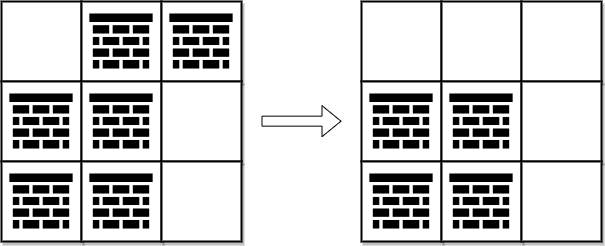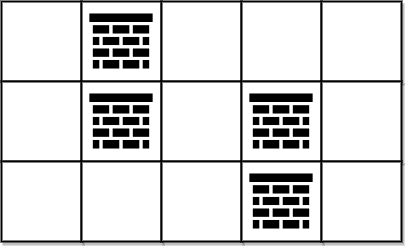代码拉取完成,页面将自动刷新
同步操作将从 doocs/leetcode 强制同步,此操作会覆盖自 Fork 仓库以来所做的任何修改,且无法恢复!!!
确定后同步将在后台操作,完成时将刷新页面,请耐心等待。
You are given a 0-indexed 2D integer array grid of size m x n. Each cell has one of two values:
0 represents an empty cell,1 represents an obstacle that may be removed.You can move up, down, left, or right from and to an empty cell.
Return the minimum number of obstacles to remove so you can move from the upper left corner (0, 0) to the lower right corner (m - 1, n - 1).
Example 1:

Input: grid = [[0,1,1],[1,1,0],[1,1,0]] Output: 2 Explanation: We can remove the obstacles at (0, 1) and (0, 2) to create a path from (0, 0) to (2, 2). It can be shown that we need to remove at least 2 obstacles, so we return 2. Note that there may be other ways to remove 2 obstacles to create a path.
Example 2:

Input: grid = [[0,1,0,0,0],[0,1,0,1,0],[0,0,0,1,0]] Output: 0 Explanation: We can move from (0, 0) to (2, 4) without removing any obstacles, so we return 0.
Constraints:
m == grid.lengthn == grid[i].length1 <= m, n <= 1052 <= m * n <= 105grid[i][j] is either 0 or 1.grid[0][0] == grid[m - 1][n - 1] == 0class Solution:
def minimumObstacles(self, grid: List[List[int]]) -> int:
m, n = len(grid), len(grid[0])
q = deque([(0, 0, 0)])
vis = set()
dirs = (-1, 0, 1, 0, -1)
while 1:
i, j, k = q.popleft()
if i == m - 1 and j == n - 1:
return k
if (i, j) in vis:
continue
vis.add((i, j))
for a, b in pairwise(dirs):
x, y = i + a, j + b
if 0 <= x < m and 0 <= y < n:
if grid[x][y] == 0:
q.appendleft((x, y, k))
else:
q.append((x, y, k + 1))
class Solution {
public int minimumObstacles(int[][] grid) {
int m = grid.length, n = grid[0].length;
Deque<int[]> q = new ArrayDeque<>();
q.offer(new int[] {0, 0, 0});
int[] dirs = {-1, 0, 1, 0, -1};
boolean[][] vis = new boolean[m][n];
while (true) {
var p = q.poll();
int i = p[0], j = p[1], k = p[2];
if (i == m - 1 && j == n - 1) {
return k;
}
if (vis[i][j]) {
continue;
}
vis[i][j] = true;
for (int h = 0; h < 4; ++h) {
int x = i + dirs[h], y = j + dirs[h + 1];
if (x >= 0 && x < m && y >= 0 && y < n) {
if (grid[x][y] == 0) {
q.offerFirst(new int[] {x, y, k});
} else {
q.offerLast(new int[] {x, y, k + 1});
}
}
}
}
}
}
class Solution {
public:
int minimumObstacles(vector<vector<int>>& grid) {
int m = grid.size(), n = grid[0].size();
deque<tuple<int, int, int>> q{{0, 0, 0}};
bool vis[m][n];
memset(vis, 0, sizeof vis);
int dirs[5] = {-1, 0, 1, 0, -1};
while (1) {
auto [i, j, k] = q.front();
q.pop_front();
if (i == m - 1 && j == n - 1) {
return k;
}
if (vis[i][j]) {
continue;
}
vis[i][j] = true;
for (int h = 0; h < 4; ++h) {
int x = i + dirs[h], y = j + dirs[h + 1];
if (x >= 0 && x < m && y >= 0 && y < n) {
if (grid[x][y] == 0) {
q.push_front({x, y, k});
} else {
q.push_back({x, y, k + 1});
}
}
}
}
}
};
func minimumObstacles(grid [][]int) int {
m, n := len(grid), len(grid[0])
q := doublylinkedlist.New()
type tuple struct{ i, j, k int }
q.Add(tuple{0, 0, 0})
vis := make([][]bool, m)
for i := range vis {
vis[i] = make([]bool, n)
}
dirs := [5]int{-1, 0, 1, 0, -1}
for {
v, _ := q.Get(0)
p := v.(tuple)
q.Remove(0)
i, j, k := p.i, p.j, p.k
if i == m-1 && j == n-1 {
return k
}
if vis[i][j] {
continue
}
vis[i][j] = true
for h := 0; h < 4; h++ {
x, y := i+dirs[h], j+dirs[h+1]
if x >= 0 && x < m && y >= 0 && y < n {
if grid[x][y] == 0 {
q.Insert(0, tuple{x, y, k})
} else {
q.Add(tuple{x, y, k + 1})
}
}
}
}
}
function minimumObstacles(grid: number[][]): number {
const m = grid.length,
n = grid[0].length;
const dirs = [
[0, 1],
[0, -1],
[1, 0],
[-1, 0],
];
let ans = Array.from({ length: m }, v => new Array(n).fill(Infinity));
ans[0][0] = 0;
let deque = [[0, 0]];
while (deque.length) {
let [x, y] = deque.shift();
for (let [dx, dy] of dirs) {
let [i, j] = [x + dx, y + dy];
if (i < 0 || i > m - 1 || j < 0 || j > n - 1) continue;
const cost = grid[i][j];
if (ans[x][y] + cost >= ans[i][j]) continue;
ans[i][j] = ans[x][y] + cost;
deque.push([i, j]);
}
}
return ans[m - 1][n - 1];
}
此处可能存在不合适展示的内容,页面不予展示。您可通过相关编辑功能自查并修改。
如您确认内容无涉及 不当用语 / 纯广告导流 / 暴力 / 低俗色情 / 侵权 / 盗版 / 虚假 / 无价值内容或违法国家有关法律法规的内容,可点击提交进行申诉,我们将尽快为您处理。